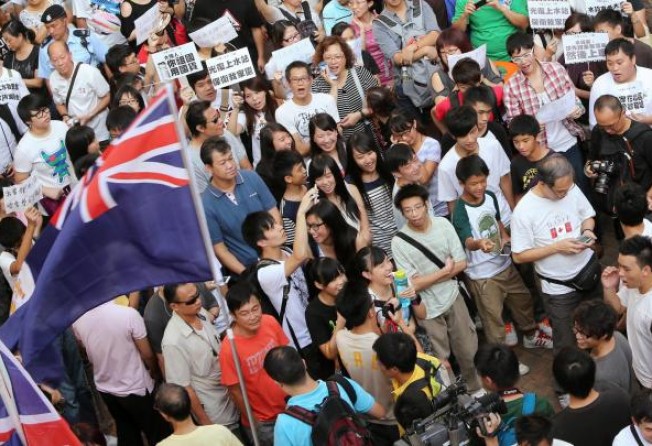Beijing finds Hongkongers' nostalgia for colonial era hard to fathom
From colonial-flag waving to tourism overkill, officials show they don't yet understand the city

Four years after Chen Zuoer retired from the Hong Kong and Macau Affairs Office, he dominated Hong Kong's newspaper headlines again two weeks ago when he lamented the waving of British flags during recent demonstrations in Hong Kong.
Chen, the former deputy director of the HKMAO, who was in town to promote his book Negotiations on The Handover of Sovereignty of Hong Kong - A Witness Recounts, said he was "heartbroken" when he saw the British flag being carried at the march on July 1.
He was also heartbroken to see a man carrying a placard with the slogan "The Chinese scram back to China!" during a recent protest against cross-border parallel traders in Sheung Shui.
For Chen, and possibly a substantial number of mainland officials, the apparently growing wave of nostalgia for the colonial era among some Hong Kong people and the resentment against mainlanders has crossed a red line.
They cannot understand why Beijing, which has spared no effort in helping Hong Kong ride out the economic hard times since the handover, still fails to win the hearts and minds of Hongkongers.
In his book, Chen recalls how the central government instructed Shenzhen Airport to handle cargo destined for Hong Kong after teething problems when Chek Lap Kok Airport opened in July 1998, and its provision of protective clothes and face masks during the deadly Sars outbreak in 2003.
Despite the sight of the British flag during recent demonstrations and the anti-mainland sentiment, calls for secession from the mainland, or independence, have never emerged as mainstream public opinion in Hong Kong.
Yet the flags, and the slogans, underlie the growing anxiety among some Hongkongers about competition from mainlanders in nearly everything, from hospital beds and baby milk formula to property.
The row over the national education curriculum also reflects a deep-seated distrust of Beijing in certain quarters of the community. Incidents such as the mysterious death of Hunan pro-democracy activist Li Wangyang further reinforced negative perceptions of mainland authorities, which were hardly offset by any economic benefits to be derived from the individual visit scheme for travellers.
Ho Ming-sze, former head of the United Front Work Department at the official Xinhua news agency's Hong Kong branch, said there was no need for mainland officials to panic about the anti-mainland sentiments expressed by some people.
"The rampant corruption on the mainland in the past few decades inevitably left some negative impressions. If the policies you implement on the mainland are reasonable, you don't need to make extra efforts to win the hearts and minds of Hong Kong people," said Ho, who quit the Communist Party in the wake of the 1989 Tiananmen Square crackdown on pro-democracy protesters.
When veteran diplomat Jiang Enzhu arrived in 1997 to become the first director of the central government's liaison office in Hong Kong, he described Hong Kong as an "abstruse book" from which he would strive to learn.
Maybe the man who documented his participation in the negotiation with British officials in Hong Kong's handover needs some extra time to study and evaluate that "abstruse book".